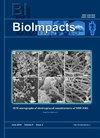Introduction of a new recombinant vaccine based on GRP78 for breast cancer immunotherapy and evaluation in a mouse model
IF 2.2
4区 工程技术
Q3 PHARMACOLOGY & PHARMACY
引用次数: 0
Abstract
Introduction: Breast cancer is one of the most prevalent malignancies in women. Several treatment options are available today, including surgery, chemotherapy, and radiotherapy. Immunotherapy, as a highly specific therapy, involves adaptive immune responses and immunological memory. In our present research, we used the recombinant C-terminal domain of the GRP78 (glucose- regulated protein 78) protein to induce an immune response and investigate its therapeutic impact in the 4T1 breast cancer model. Methods: BALB/c mice were immunized with the cGRP78 protein. The humoral immune response was assessed by ELISA. Then, BALB/c mice were injected subcutaneously with 1×106 4T1 tumor cells. Subsequently, tumor size and survival rate measurements, MTT, and cytokine assays were performed. Results: The animals receiving the cGRP78 vaccine showed significantly more favorable survival and slower tumor growth rates compared with unvaccinated tumor-bearing mice as the negative control mice. Circulating levels of tumoricidal cytokines such as IFNγ were higher, whereas tolerogenic cytokines such as IL-2, 6, and 10 either did not increase or had a decreasing trend in mice receiving cGRP78. Conclusion: cGRP78 vaccines generated potent immunotherapeutic effects in a breast cancer mouse model. This novel strategy of targeting the GRP78 protein can promote the development of cancer vaccines and immunotherapies for breast cancer malignancies.一种基于GRP78的乳腺癌免疫治疗重组疫苗的介绍及小鼠模型评价
乳腺癌是女性中最常见的恶性肿瘤之一。目前有几种治疗方法可供选择,包括手术、化疗和放疗。免疫治疗是一种高度特异性的治疗方法,涉及适应性免疫反应和免疫记忆。在我们目前的研究中,我们利用GRP78(葡萄糖调节蛋白78)蛋白的重组c端结构域诱导免疫应答,并研究其在4T1乳腺癌模型中的治疗作用。方法:用cGRP78蛋白免疫BALB/c小鼠。采用酶联免疫吸附测定体液免疫应答。然后,给BALB/c小鼠皮下注射1×106 4T1肿瘤细胞。随后,进行肿瘤大小和存活率测量、MTT和细胞因子测定。结果:与未接种cGRP78疫苗的荷瘤小鼠相比,接种cGRP78疫苗的小鼠存活率明显提高,肿瘤生长速度明显减慢。在接受cGRP78的小鼠中,IFNγ等杀肿瘤细胞因子的循环水平较高,而IL-2、6和10等耐受性细胞因子没有增加或呈下降趋势。结论:cGRP78疫苗在乳腺癌小鼠模型中具有较强的免疫治疗作用。这种靶向GRP78蛋白的新策略可以促进乳腺癌恶性肿瘤疫苗和免疫疗法的发展。
本文章由计算机程序翻译,如有差异,请以英文原文为准。
求助全文
约1分钟内获得全文
求助全文
来源期刊

Bioimpacts
Pharmacology, Toxicology and Pharmaceutics-Pharmaceutical Science
CiteScore
4.80
自引率
7.70%
发文量
36
审稿时长
5 weeks
期刊介绍:
BioImpacts (BI) is a peer-reviewed multidisciplinary international journal, covering original research articles, reviews, commentaries, hypotheses, methodologies, and visions/reflections dealing with all aspects of biological and biomedical researches at molecular, cellular, functional and translational dimensions.
 求助内容:
求助内容: 应助结果提醒方式:
应助结果提醒方式:


